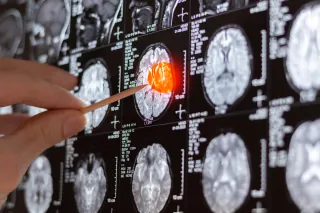
Breakthrough AI Technology Revolutionizes Detection of Brain Cancer Spread – No Surgery Required!
2025-01-14
Author: William
Breakthrough AI Technology Revolutionizes Detection of Brain Cancer Spread – No Surgery Required!
In a groundbreaking development, researchers have harnessed the power of artificial intelligence (AI) to detect the spread of metastatic brain cancer through MRI scans, enabling a non-invasive method to gain crucial insights into patients’ conditions.
The proof-of-concept study, spearheaded by Dr. Matthew Dankner and Dr. Reza Forghani from McGill University, in collaboration with an international team of clinicians and scientists, revealed that the AI model can identify cancer cells in surrounding brain tissue with an impressive 85% accuracy rate. This innovative approach holds significant promise for improving patient outcomes, especially considering that traditional methods often require invasive surgical procedures.
The research team evaluated MRI scans from over 130 patients who underwent surgery to remove brain metastases at The Neuro (Montreal Neurological Institute-Hospital). The AI’s findings were validated by cross-referencing them with pathological observations made by doctors who examined the tumor tissue under a microscope.
Understanding Brain Metastases
Brain metastases—the most prevalent type of brain cancer—occur when cancer cells migrate from other body parts to the brain, often resulting in aggressive tumors that can invade healthy brain tissue. Such invasiveness complicates treatment options and poses a severe risk of tumor regrowth. "Our previous research has shown that invasive brain metastases are associated with shorter survival and increased risk of recurrence. These findings underline the immense potential of machine learning to enhance our understanding of cancer and its therapeutic strategies," stated Dankner, an Internal Medicine Resident at McGill and a post-doctoral researcher at the Rosalind & Morris Goodman Cancer Institute.
AI Detects Subtle Signs of Cancer Spread
The AI model is adept at recognizing nuanced changes in surrounding brain tissue that suggest cancer spread, identifying patterns that often elude traditional imaging techniques that depend on human interpretation. Developed in Forghani's lab during his tenure at the Research Institute of the McGill University Health Centre and the University of Florida College of Medicine, this innovation marks a significant advance in cancer diagnostics.
Earlier this year, the research team also identified potential drugs that could treat certain types of brain metastases. However, for doctors to determine which patients may benefit from these treatments, it is crucial to ascertain whether the cancer has infiltrated the surrounding tissue. While surgery is commonly employed, it is not a viable option for all patients, particularly those with challenging tumor locations or health conditions that render surgery too perilous.
Dr. Benjamin Rehany, a Radiology Resident at the University of Toronto and one of the leading authors of the study, emphasized that with further refinement, their AI model could soon be integrated into clinical practice, allowing for earlier and more precise detection of cancer spread within the brain.
As the research is still in its infancy, the team has ambitious plans to expand their study using larger datasets and enhance the AI model for practical application in hospitals and clinics.
This pioneering research received generous support from several organizations, including the Canadian Cancer Society, the Canadian Institutes of Health Research, the Brain Canada Foundation, Health Canada, the Fonds de recherche du Québec - Santé, and the Fondation de l’Association des radiologistes du Québec.
Conclusion
Stay tuned as this transformative AI technology continues to evolve, potentially reshaping the future of cancer diagnostics and treatment!









 Brasil (PT)
Brasil (PT)
 Canada (EN)
Canada (EN)
 Chile (ES)
Chile (ES)
 Česko (CS)
Česko (CS)
 대한민국 (KO)
대한민국 (KO)
 España (ES)
España (ES)
 France (FR)
France (FR)
 Hong Kong (EN)
Hong Kong (EN)
 Italia (IT)
Italia (IT)
 日本 (JA)
日本 (JA)
 Magyarország (HU)
Magyarország (HU)
 Norge (NO)
Norge (NO)
 Polska (PL)
Polska (PL)
 Schweiz (DE)
Schweiz (DE)
 Singapore (EN)
Singapore (EN)
 Sverige (SV)
Sverige (SV)
 Suomi (FI)
Suomi (FI)
 Türkiye (TR)
Türkiye (TR)